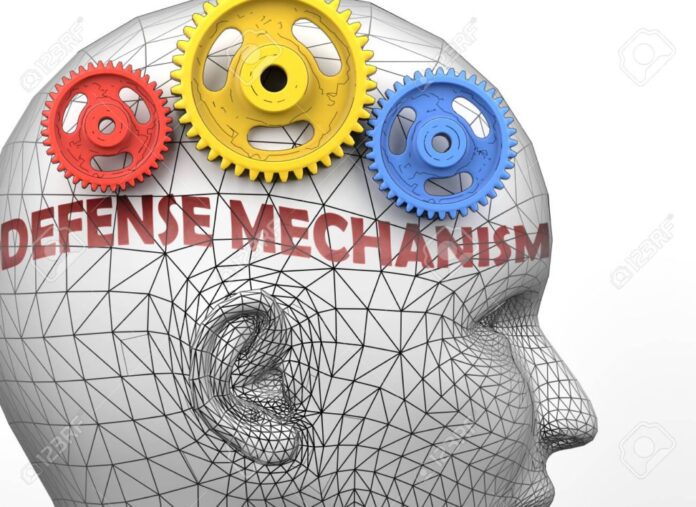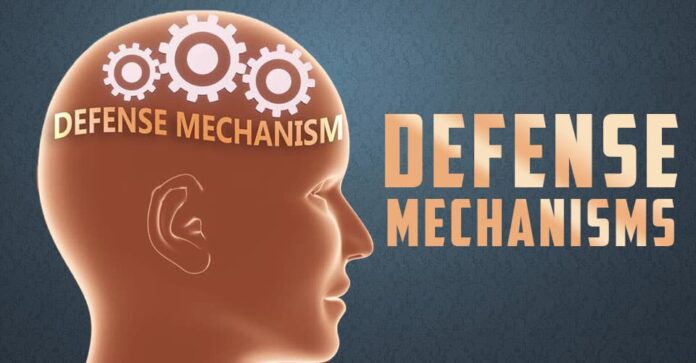Nobody wants to feel emotional pain. If you could live your life without discomfort, that would be ideal, but that’s not a realistic expectation. It’s crucial to address these issues so they don’t impact your mental health. People tend to avoid feeling bad, and that’s where defense mechanisms come into play. Defense mechanisms are psychological behaviors that protect a person from experiencing anxiety-ridden thoughts and feelings associated with life stressors. When you’re triggered, your defense mechanisms may show up to help you protect yourself from pain. Here is more about defense mechanisms and how they help you deal with emotional distress.
What are defense mechanisms?

Renowned psychoanalyst Sigmund Freud and his daughter Anna identified and developed ten defense mechanisms that people use unconsciously to deal with emotional pain. According to Freud these are the ten defense mechanisms:
- Denial
- Repression
- Projection
- Displacement
- Sublimation
- Reaction Formation
- Introjection
- Identification with the aggressor
We will explore four common defense mechanisms in this article, but you can read more about the others. It’s important to understand what’s going on with you emotionally, and part of that is reading about defense mechanisms.. You can read more about them on BetterHelp. Once you have a better understanding of the unconscious behaviors you’re using to avoid pain, you will be able to learn better coping strategies to handle discomfort.
Four common defense mechanisms
Denial – When a person is emotionally overwhelmed and feels they cannot handle a situation, they can respond by pretending it doesn’t exist. That’s what denial is when people live in a false reality. Denial isn’t effective when it comes to coping mechanisms. It leaves a person stuck with a false sense of security. Additionally, denying that things aren’t happening can be a dangerous defense mechanism. Matters can worsen, and the person in denial is hiding under a proverbial blanket. People deny that terrible things are happening (or occurred in the past) because they lack adaptive coping strategies to deal with them.

Repression – Repression is an unconscious defense mechanism when a person wants to avoid disturbing thoughts or memories. Instead of dealing with these issues, they push them down into the subconscious. It’s an unintentional way to attempt to cope with traumatic incidents. Anna Freud (Sigmund Freud’s daughter) deemed repression “motivated forgetting.” A person unintentionally cannot remember upsetting details because if they came up into the conscious reality, it would be too troublesome. So, instead of dealing with them, they forget.
Sometimes repressed memories come out slowly in bits and pieces. Some individuals go to therapy to try to access their forgotten memories.
Projection – Projection is a defense mechanism where a person attributes unwanted feelings, motivations, and thoughts onto other individuals. It’s difficult to confront disturbing ideas and attribute them to yourself. They realize that they’re experiencing these upsetting desires or ideas, and it’s too painful for them to deal with for a multitude of reasons. Instead of accepting that these are things that belong to them, they project them onto another individual. It’s a maladaptive coping strategy, and it discourages people from taking accountability for their actions.
Defense mechanisms can be unhealthy

Defense mechanisms serve a purpose; however unhealthy that might be, otherwise, they would stick around. When you employ them, it’s because your psyche isn’t ready to deal with the pain you’re experiencing. The trouble is that you’re deceiving yourself, even if it’s unintentional. For example, when you’re repressing memories, so you don’t have to deal with the pain, you’re not doing it on purpose, but your subconscious is tricking your conscious mind.
You’re hiding emotions, so you don’t have to experience pain, anxiety, anger, or any discomfort. Defense mechanisms typically occur on an unconscious level. You’re not aware of what’s happening within you, but that doesn’t mean you can’t develop that awareness. You can do some inner work to find out why you’re using particular defense mechanisms, find greater emotional awareness and start taking responsibility for your feelings.
Coping with defense mechanisms
It’s important to develop healthy strategies to deal with defense mechanisms. You’re not going to grow by ignoring them, so it’s better to face them. Here are some ways to handle defense mechanisms when they come up.
Learn accountability: You may not realize that you’re employing a defense mechanism since they’re often unconscious. That’s why it’s crucial to ask for help from outsiders to look out for these behaviors. One way to learn to take accountability is to have people you trust to let you know when you’re being defensive. Your friends, family, or loved ones can let you know when you’re employing defensive mechanisms and tell you what those are. That way, you’re on the road to greater emotional awareness.
Discover coping strategies: If you’re struggling with unhealthy defense mechanisms, therapy is an excellent place to work through these concerns. You can see a mental health professional and talk about defense mechanisms. The provider may recognize when you’re projecting or in denial. They can help you learn to be more present in your feelings. Rather than denying what’s happening, you can learn to be mindful and more emotionally aware.
Journal: Sometimes, it’s hard to recognize when you’re employing a defense mechanism. It can help to write down what’s happening for you. Maybe you suspect that you have repressed memories but aren’t sure. When you feel pain or discomfort, writing about it may help uncover whether there are hidden defense mechanisms at play.
Talk about defense mechanisms in therapy

Therapy is an excellent place to discover the truth about defense mechanisms. You can trust a mental health professional to guide you in learning about yourself. Remember, defense mechanisms are a normal part of life. The trouble comes when you’re relying on them too heavily to avoid feeling pain. Don’t be afraid to reach out for help to a therapist, whether it’s online or in your city or town. There’s no wrong way to feel. Once you discuss your problems in therapy, you’ll likely find clarity and a new sense of confidence in expressing yourself.









